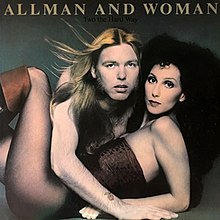Two_the_Hard_Way
Two the Hard Way
1977 studio album by Allman and Woman
Two the Hard Way is the collaborative studio album by American singer and actress Cher (credited as "Woman") and American singer and keyboardist Gregg Allman. It was released in November 1977 by Warner Bros. Records. The album, billed to "Allman and Woman", was a critical and commercial failure.
| Two the Hard Way | ||||
|---|---|---|---|---|
 | ||||
| Studio album by | ||||
| Released | November 1977 | |||
| Recorded | 1977 | |||
| Studio | Record Plant, Los Angeles; Sunset Sound, Hollywood; Record Plant, New York City | |||
| Genre | Pop rock | |||
| Length | 38:35 | |||
| Label | Warner Bros. | |||
| Producer |
| |||
| Cher chronology | ||||
| ||||
| Gregg Allman chronology | ||||
| ||||
| Singles from Two the Hard Way | ||||
| ||||
| Review scores | |
|---|---|
| Source | Rating |
| AllMusic | |
| The Encyclopedia of Popular Music | |
| MusicHound Rock: The Essential Album Guide | |
The product of the two musicians' unlikely and turbulent relationship and marriage, it attempted an even more unlikely musical melding of Allman's Southern rock with Cher's idiosyncratic, personality-driven pop. The uncharacteristically airbrushed cover notwithstanding, Allman's musical ideas and singing generally took the lead.
In conjunction with the release of the album Cher and Allman did a 21-show tour called the "Two the Hard Way Tour", consisting of seven shows in Japan and 14 in Europe. The tour ended abruptly when Cher parted ways with Allman and returned to the United States.
The album was panned by critics; the 1979 Rolling Stone Record Guide said "It's hard to imagine a more inappropriate combination ... It's the bottom of the barrel after a long fall for Gregg, and more of the same for Cher," and rated the album "Worthless". Two the Hard Way was also sold poorly; by the time the 1983 edition of the same guide was published, the album was out of print.
The album was never officially re-issued on CD or 8-track, although it has been bootlegged. In 2008, Billboard correspondent Keith Caulfield stated that Cher owned the rights to the master tapes of this album (as well as three solo albums she made in the mid-1970s) and hence she would have to approve any reissues.[4] The song "Can You Fool" was included in the 1989 Allman Brothers compilation album Dreams, which is still in print.
For many years "Can You Fool" was the only Allman and Woman song to have been officially made available online. However, on October 8, 2021, Cher released all 11 tracks, "restored and remastered", on her YouTube channel. A few days later, she also released several live videos produced in November 1977 for the BBC TV series The Old Grey Whistle Test.
| No. | Title | Writer(s) | Length |
|---|---|---|---|
| 1. | "Move Me" |
| 2:58 |
| 2. | "I Found You Love" | Alan Gordon | 3:58 |
| 3. | "Can You Fool" | Michael Smotherman | 3:21 |
| 4. | "You've Really Got a Hold on Me" | Smokey Robinson | 3:18 |
| 5. | "We're Gonna Make It" |
| 3:15 |
| 6. | "Do What You Gotta Do" | Jimmy Webb | 3:26 |
| No. | Title | Writer(s) | Length |
|---|---|---|---|
| 1. | "In For the Night" | 3:34 | |
| 2. | "Shadow Dream Song" (lead vocals by Gregg Allman) | Jackson Browne | 3:43 |
| 3. | "Island" (lead vocals by Cher) | Ilene Rappaport | 4:25 |
| 4. | "I Love Makin' Love to You" |
| 3:49 |
| 5. | "Love Me" | 2:48 |
- Cher – lead vocals, harmony vocals
- Gregg Allman – lead vocals, harmony vocals, organ, producer
- Ricky Hirsch, John Leslie Hug, Fred Tackett, Scott Boyer – guitar
- Willie Weeks – bass
- Neil Larsen – piano, electric piano, clavinet, organ
- Randall Bramblett, Harvey Thompson, Ronnie Eades – saxophone
- Harrison Calloway, Jim Horn – horn
- Ben Cauley – trumpet, flugelhorn
- Dennis Good – trombone
- Mickey Raphael – harmonica
- Bobbye Hall – percussion
- Bill Stewart – drums
- Clydie King, Doug Hayward, Pat Henderson, Russell Morris, Sherlie Matthews, Tim Schmit – backing vocals
- Jimmy Webb – string and horn arrangements on "We're Gonna Make It" and "Do What You Gotta Do"
- Ed Freeman – string arrangements
- Sid Sharp – concertmaster
Technical
- Johnny Sandlin – producer
- John Haeny – producer on "You Really Got a Hold On Me" and "Do What You Gotta Do"
- Tom Flye – engineer
- David Pinkston – engineer
- John Cabalka – art direction
- Brad Kanawyer – design
- Bob Jacobs – artwork, photo hand tinting
- Harry Langdon – photography
- Ruhlmann, William (2011). "Two the Hard Way – Allman and Woman". AllMusic. Retrieved 7 August 2011.
- Larkin, Colin (2006). The Encyclopedia of Popular Music. Vol. 1. MUZE. p. 136.
- MusicHound Rock: The Essential Album Guide. Visible Ink Press. 1999. p. 1051.
- "Ask Billboard: Sharing Cher On CD". Billboard. 2008-07-25. Retrieved 2012-03-11.